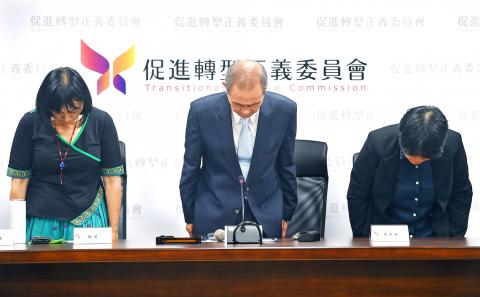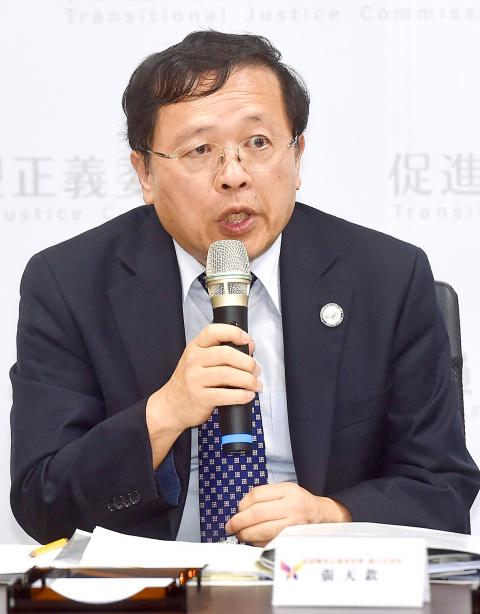Transitional Justice Commission Deputy Chairman Chang Tien-chin (張天欽) has resigned over his alleged plan to manipulate public opinion so that Chinese Nationalist Party (KMT) New Taipei City mayoral candidate Hou You-yi (侯友宜) would be held accountable for his actions during the White Terror era.
Chang’s resignation came in the aftermath of a leaked audio recording of an informal meeting on Aug. 24, which was allegedly attended by Chang, commission Secretary-General Hsu Chun-ju (許君如), as well as two commission researchers and two associate researchers.
According to a partial transcript published yesterday by the Chinese-language Mirror Media magazine, Chang asked the participants to brainstorm on how to enforce a lustration law that the commission had planned to draw up and, specifically, how to use it against Hou, whom Chang called the “most despicable case [of concern] in transitional justice.”

Photo: Liao Chen-huei, Taipei Times
Adopted by several nations that have undergone transitional justice, a lustration law is a mechanism to examine whether a person holding public office occupied any “suspicious positions” in the previous authoritarian regime.
“It will be a pity if we do not manipulate [public opinion] against Hou,” Chang allegedly said in the meeting, adding that the commission should find cases from other countries that are similar to Hou’s and use them to convince the public of the need to hold Hou accountable for his actions.
Hou headed the Taipei Police Department’s Criminal Investigation Division in its failed attempt to arrest — at the behest of the KMT regime — democracy activist Deng Nan-jung (鄭南榕) at the office of his Freedom Era Weekly magazine in 1989. Deng refused to be taken alive, immolating himself after locking himself in the office.

Photo: Chien Jung-fong, Taipei Times
Chang issued a statement announcing his resignation shortly after the story broke, apologizing for damage to the commission’s image and credibility.
“It is not easy for the nation to begin its transitional justice efforts, which is why many political victims and their families have high hopes for the commission,” Chang said.
“Most commission staff members have been racing against time and hoping to complete its final report within two years. Their endeavor should not be affected by the leaked recording,” he added.
The commission would never become a campaign tool, Commission Chairman Huang Huang-hsiung (黃煌雄) told a news conference yesterday afternoon, adding that he had approved Chang’s resignation.
Huang and the commission’s three full-time members bowed in apology to the public over the scandal.
“I want to reiterate that the commission is an independent body established in accordance with the law, which transcends partisan politics. None of its employees are allowed to participate in political activities, nor would we ever entangle our transitional justice efforts with elections,” Huang said.
Huang said staff members at the meeting convened by Chang were merely discussing issues among themselves, and did not represent the commission’s stance, but added that an investigation would be launched into the matter.
Apologizing to the public on behalf of the Executive Yuan,Premier William Lai (賴清德) yesterday said the Executive Yuan found Chang’s remarks “utterly unacceptable.”
“Chang’s comments have not only undermined the commission’s credibility, but have also fueled social divisions,” Lai said.
Presidential Office spokesman Sidney Lin (林鶴明) said the tasks that the commission has been entrusted with do not target any individual, nor are they designed to improve a party’s competitiveness.
“The key to the smooth fulfillment of these tasks is ensuring an independent and objective stance in the process... Chang’s remarks, whether made publicly or in private, were inappropriate,” he said.
Additional reporting by CNA

SECURITY: As China is ‘reshaping’ Hong Kong’s population, Taiwan must raise the eligibility threshold for applications from Hong Kongers, Chiu Chui-cheng said When Hong Kong and Macau citizens apply for residency in Taiwan, it would be under a new category that includes a “national security observation period,” Mainland Affairs Council (MAC) Minister Chiu Chui-cheng (邱垂正) said yesterday. President William Lai (賴清德) on March 13 announced 17 strategies to counter China’s aggression toward Taiwan, including incorporating national security considerations into the review process for residency applications from Hong Kong and Macau citizens. The situation in Hong Kong is constantly changing, Chiu said to media yesterday on the sidelines of the Taipei Technology Run hosted by the Taipei Neihu Technology Park Development Association. With

CARROT AND STICK: While unrelenting in its military threats, China attracted nearly 40,000 Taiwanese to over 400 business events last year Nearly 40,000 Taiwanese last year joined industry events in China, such as conferences and trade fairs, supported by the Chinese government, a study showed yesterday, as Beijing ramps up a charm offensive toward Taipei alongside military pressure. China has long taken a carrot-and-stick approach to Taiwan, threatening it with the prospect of military action while reaching out to those it believes are amenable to Beijing’s point of view. Taiwanese security officials are wary of what they see as Beijing’s influence campaigns to sway public opinion after Taipei and Beijing gradually resumed travel links halted by the COVID-19 pandemic, but the scale of

A US Marine Corps regiment equipped with Naval Strike Missiles (NSM) is set to participate in the upcoming Balikatan 25 exercise in the Luzon Strait, marking the system’s first-ever deployment in the Philippines. US and Philippine officials have separately confirmed that the Navy Marine Expeditionary Ship Interdiction System (NMESIS) — the mobile launch platform for the Naval Strike Missile — would take part in the joint exercise. The missiles are being deployed to “a strategic first island chain chokepoint” in the waters between Taiwan proper and the Philippines, US-based Naval News reported. “The Luzon Strait and Bashi Channel represent a critical access

Pope Francis is be laid to rest on Saturday after lying in state for three days in St Peter’s Basilica, where the faithful are expected to flock to pay their respects to history’s first Latin American pontiff. The cardinals met yesterday in the Vatican’s synod hall to chart the next steps before a conclave begins to choose Francis’ successor, as condolences poured in from around the world. According to current norms, the conclave must begin between May 5 and 10. The cardinals set the funeral for Saturday at 10am in St Peter’s Square, to be celebrated by the dean of the College